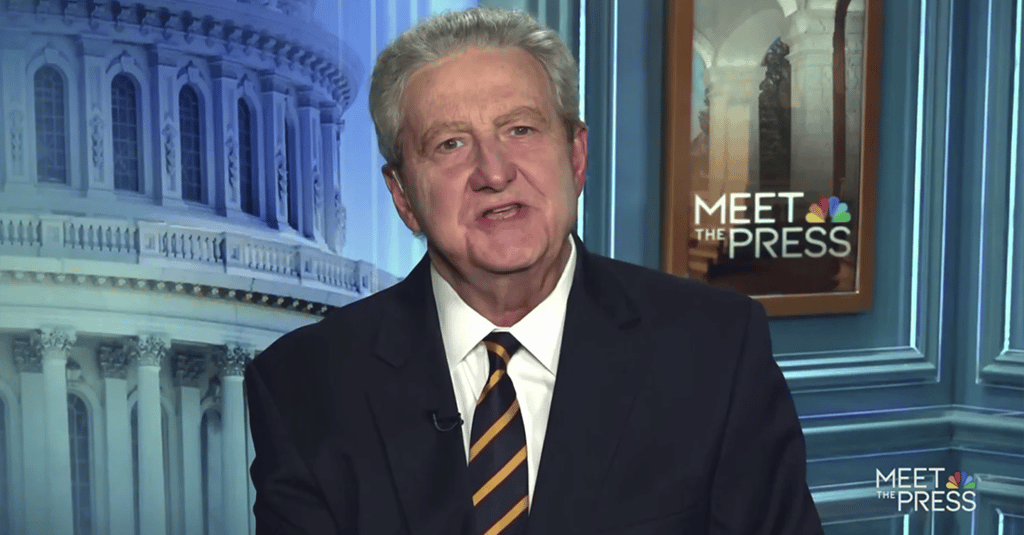Trump’s Foreign Prison Plan Sparks Controversy: Sen. Kennedy Pushes Back
4/26/20253 min read


Trump’s Foreign Prison Plan Sparks Controversy: Sen. Kennedy Pushes Back
President Donald Trump’s recent suggestion to send American criminals to foreign prisons has ignited a firestorm of debate, with GOP Senator John Kennedy of Louisiana firmly opposing the idea. In a candid interview on NBC’s Meet the Press, Kennedy called the proposal unconstitutional and impractical, citing the Eighth Amendment’s protections against cruel and unusual punishment. This bold stance, combined with the Trump administration’s recent deportation blunder involving a Maryland man, raises serious questions about the direction of U.S. criminal justice policy. Let’s unpack this contentious issue and explore its implications.
Kennedy’s Constitutional Stand
Sen. John Kennedy didn’t mince words when asked about Trump’s plan to ship “homegrown criminals” to foreign prisons. “No, Ma’am,” he told Meet the Press host Kristen Welker, emphasizing that U.S. laws, particularly the Eighth Amendment, prohibit such measures. The amendment safeguards against excessive punishment, and Kennedy argued that outsourcing incarceration to foreign nations could violate these protections. His position underscores a broader concern: Can the U.S. maintain its legal and moral standards while exploring radical criminal justice reforms?
Trump’s comments, made during a Fox News interview, framed the idea as a solution for dealing with domestic offenders who “grew up and something went wrong.” While the president expressed enthusiasm for the concept, he provided little detail on how it would work or which countries might be involved. The lack of clarity has fueled skepticism, with critics like Kennedy questioning both the legality and the wisdom of the proposal.
A Deportation Misstep Fuels the Debate
The Trump administration’s handling of Kilmar Abrego Garcia, a Maryland man mistakenly deported to El Salvador, has added fuel to the controversy. The administration alleges Abrego Garcia is an MS-13 gang member, a claim his wife and legal team vehemently deny. Kennedy called the deportation a “screw-up” but downplayed concerns about systemic issues, expressing confidence in the administration’s ability to avoid similar mistakes.
This incident highlights the risks of aggressive immigration and criminal justice policies. If a U.S. citizen can be erroneously deported, what safeguards would protect Americans from being sent to foreign prisons? The Abrego Garcia case serves as a cautionary tale, amplifying fears that Trump’s foreign prison plan could lead to human rights violations or administrative errors.
Why Foreign Prisons Are a Bad Idea
Sending U.S. citizens to foreign prisons raises a host of practical and ethical challenges. First, there’s the question of oversight. U.S. authorities would have limited control over conditions in foreign facilities, which could range from adequate to inhumane. Reports from international human rights organizations often highlight overcrowding, abuse, and neglect in prisons across the globe. Exposing American citizens to such environments could violate constitutional protections and invite legal challenges.
Second, the logistics are daunting. Which countries would agree to house U.S. prisoners, and at what cost? Would taxpayers foot the bill for incarceration abroad, or would foreign governments demand compensation? The diplomatic ramifications could also be significant, potentially straining alliances or creating new geopolitical tensions.
Finally, there’s the moral argument. The U.S. has long prided itself on its justice system, flawed though it may be. Outsourcing punishment to foreign nations risks undermining this legacy, signaling that America is unwilling or unable to address its own criminal justice challenges. As Kennedy suggested, the focus should be on strengthening domestic systems, not offloading problems elsewhere.
Trump’s Broader Agenda
Trump’s foreign prison proposal is part of a larger pattern of unconventional ideas floated during his presidency. From challenging the Federal Reserve’s independence to pushing for sweeping immigration reforms, Trump has consistently tested the boundaries of executive authority. Kennedy, in the same Meet the Press interview, also expressed doubt about Trump’s ability to fire a Federal Reserve chair, highlighting another area where the senator sees limits to presidential power.
These debates reflect deeper divisions within the Republican Party. While some GOP lawmakers embrace Trump’s bold proposals, others, like Kennedy, advocate for a more restrained approach grounded in constitutional principles. This tension will likely shape the party’s priorities as Trump’s administration moves forward.
What’s at Stake?
The idea of sending Americans to foreign prisons may seem far-fetched, but it underscores critical issues about justice, human rights, and executive overreach. If pursued, the policy could set a dangerous precedent, eroding trust in the legal system and exposing citizens to unforeseen risks. Kennedy’s opposition serves as a reminder that even within Trump’s own party, there’s resistance to ideas that push too far beyond established norms.
As the debate unfolds, the public must grapple with competing visions of criminal justice. Should the U.S. double down on domestic reforms, or explore radical solutions like foreign incarceration? The answers will shape not only the fate of Trump’s proposal but also the broader trajectory of American justice.
Thought Questions
Do you think sending U.S. citizens to foreign prisons could ever be justified, or is it inherently unconstitutional?
How should the Trump administration address the fallout from cases like Kilmar Abrego Garcia’s mistaken deportation?
What role should constitutional protections, like the Eighth Amendment, play in shaping modern criminal justice policies?
Picture Credit: MEET THE PRESS. Thank you
hello@boncopia.com
+13286036419
© 2025. All rights reserved.